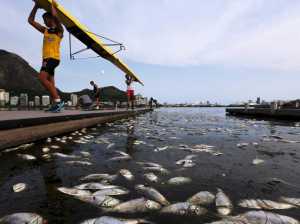When Rio won the Olympics big promises were made. Their vision of the 2016 games was going to “regenerate Rio’s magnificent waterways,” but the promises were already falling short before the arrival of the Zika Virus.
In the summer of 2015 independent testing of the pollution levels revealed the future Olympic waters to be 1.7 million times what would be considered hazardous on a Southern California beach. A different risk assessment measuring the amount of viruses  in the water found a 99% risk of infection. This assessment was assuming athletes only ingest about 3 teaspoons of water and the athletes say they ingest far more than that. Another found the levels of fecal coliforms, which can cause ear infection, cholera, dysentery, hepatitis A and typhoid, exceed Brazil’s own legal limit. Less than a month ago thousands of dead fish washed up on the shores of Guanabara Bay providing an unwelcome addition
in the water found a 99% risk of infection. This assessment was assuming athletes only ingest about 3 teaspoons of water and the athletes say they ingest far more than that. Another found the levels of fecal coliforms, which can cause ear infection, cholera, dysentery, hepatitis A and typhoid, exceed Brazil’s own legal limit. Less than a month ago thousands of dead fish washed up on the shores of Guanabara Bay providing an unwelcome addition to the normal trash and sewage scenery.
to the normal trash and sewage scenery.
The majority or Brazil’s sewage is untreated and flows freely through open-air ditches into streams and rivers creating a pollution problem that stems from the smallest stream to the biggest bay. Despite the big promises made for the games—which included “waste management”—with about 6 months to go Brazilian officials admit the water will not be as clean as promised. In an unprecedented move the Dutch environmental ministry called upon its experts, businesses, and NGOs to develop 20 proposals to deal with Rio’s problem. The Clean Urban Delta Initiative combines education, infrastructure, technology and communication to change the entire environment around the waterways. It was developed for Rio with the hope that Rio could be a case study for future applications across the world. But Brazil can’t afford it. Economic issues in the country had the president of The Association of Summer Olympic International Federations saying “the Rio Games were in “the most risky position” of any Olympics he could remember” and that was in May of 2014 before the water testing and Zika were problems. With less than 6 months to go it will certainly be interesting to see what happens with the 2016 games.